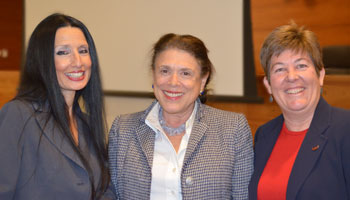Can you patent a gene? Should genetically engineered fish be considered food or animal? What does it all mean to indigenous peoples and everyone else? Rebecca Tsosie posed these provocative questions and others as she explored the legal and ethical implications of treating the genome as a "commons" in which scientists freely explore on their quest for new discoveries.

DNA Day Lecturer Rebecca Tsosie, donor Carlyn Steiner and Institute for Public Health Genetics Director Karen Edwards
Tsosie, the Regents' Professor of Law at Arizona State University, gave the University of Washington's second Annual DNA Day Lecture on April 17, co-sponsored by the Schools of Public Health and Law. An expert on Indian law and a Native American of Yaqui descent, Tsosie stressed the importance of using contemporary public policy to protect what is "sacred" to indigenous peoples.
"You guys are reconstructing in an interdisciplinary way what is embedded in the cultural epistemologies of indigenous peoples, and that is a very, very powerful consciousness," Tsosie told her diverse academic crowd. "I'm inviting you to join me on this new way of thinking and dialogue where we can respect each other … to create a better future for all of us."
Alice Popejoy, a PhD student in public health genetics, was one of many students to engage Tsosie vigorously about her views of science. "It's really important to have these interdisciplinary talks that bridge concepts across disciplines," Popejoy said afterward. "A lot of disciplines are siloed. One of the strengths of the public health genetics program is its ability to integrate many disciplines across genetics and bioethics. It promotes the type of ethical science that Rebecca Tsosie is calling for: a process that values the interests and concerns of populations affected by scientific research."
DNA Day commemorates the discovery of the DNA double-helix structure in 1953 as well as the completion of the human genome project a decade ago. The UW's DNA Day lecture was organized by the Institute for Public Health Genetics, an interdisciplinary program that brings together faculty from nearly every school and many departments. "We're the only program of its kind to offer a PhD, MPH, a JD/MPH, a certificate in public health genetics as well as a master's degree in genetic epidemiology," Director Karen Edwards said.
Last year's inaugural DNA Day speaker was Gil Omenn, who served as Dean of the School of Public Health from 1982-97 and was instrumental in forming the Institute more than 15 years ago, Edwards noted.
This year's lecture was made possible by financial support from Carlyn Steiner, a UW Law graduate who also has served as the School of Public Health representative on the University of Washington board since 2007. Steiner not only contributed her own personal funds, she also was instrumental in getting the School of Law to use the Carl G. Koch Endowed Fund to enable the lecture. Koch, who was Steiner's father, was a 1940 graduate of UW School of Law who passed away in 1987. "I suggested using that fund to support a lecture at the intersection of public health and the law," Steiner said. "I'm trying to breathe a little life into his legacy."
Steiner is a graduate of Smith College who worked for King County government for many years. After earning a degree from the UW School of Law, she practiced for 10 years and still does some legal work in estate planning. She and her late husband, George Steiner, established an endowed fellowship to support students in the Health Sciences and she has been part of ARCS (Achievement Rewards for College Scientists) since 1990. Steiner said supporting public health students and young scientists can lead to a "better understanding of how the world works" and "how to make the world a better place to live in."
Pat McCowan, assistant dean for advancement at the School of Public Health, said the DNA lecture "is a great example of how schools across campus can collaborate and bring speakers, discussion and topics that transcend individual programs."
